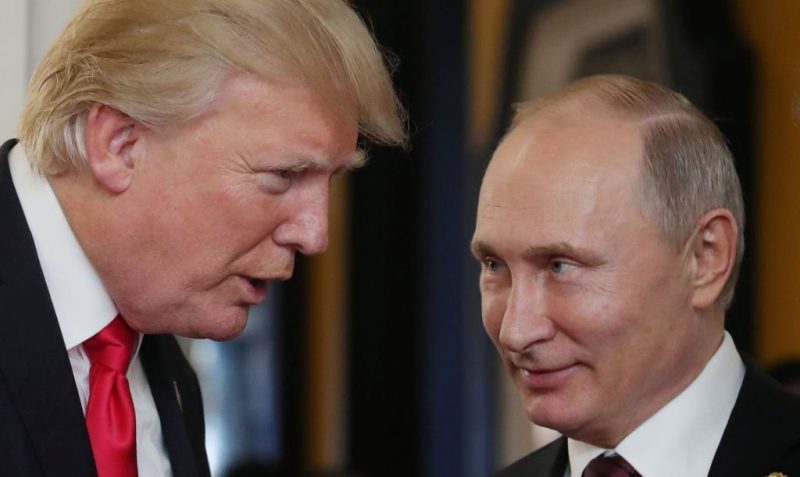
Any reasonable person would have to welcome the summit between US President Donald Trump and Russian President Vladimir Putin to be held on July 16 in Helsinki.
However, what is most telling is the crescendo of scurrilous attempts purveyed by Western news media to spoil the forthcoming meeting. Trump’s political enemies in the US are almost apoplectic that he is willing to engage in a cordial, constructive fashion with the Russian leader.
The anti-Russia tropes are being dredged up to denigrate Putin and by extension Trump for holding the conference. Trump is being lambasted for daring to engage with an alleged “autocrat” who allegedly “annexed Crimea”, who has allegedly aided and abetted a “dictator” in Syria, and who allegedly ordered Kremlin agents to “interfere in US elections”.
On the latter accusation of electoral interference, a recent analysis piece by Jack Matlock, the former US ambassador to the Soviet Union, is both welcome and highly instructive.
Matlock, who is a veteran of assessing top-secret files, makes a withering assessment that the so-called US intelligence claims of Russian interference in the 2016 presidential elections was “politically motivated”.
The respected diplomat debunks the “intelligence” and subsequent media mantra as cooked up like the earlier shameful scam over Iraq’s weapons of mass destruction. In short, fabricated.
The list of alleged Russian malfeasance has expanded like elastic in recent years. But as Russia’s Foreign Minister Sergei Lavrov cogently pointed out in a recent British media interview not one of these attenuated claims has ever produced substantiating evidence.
One suspects that the strange case this week of an English man and woman being allegedly poisoned with a nerve agent is a contrived timely reminder of the Skripal poisoning affair which happened in Salisbury four months ago.
As with all Western media campaigns attempting to smear Russia, the alleged poison cases rely on pejorative innuendo and assertions, spun by a dutiful and derelict news media.
Plausibly, the timing of the latest “story” of an alleged Soviet-made chemical weapon being deployed in Britain is a convenient excuse to further undermine the forthcoming Trump-Putin summit.
Next week also sees a major NATO summit in Brussels during which delegates are to dwell – as they ever tediously do – on alleged Russian aggression. The strange case of poisoning this week in England – which the authorities there have used to once again implicate Russian involvement – will no doubt lend added animus to the NATO agenda.
Trump’s political opponents in the US have been bolstered by pro-Atlanticists in Europe who are claiming that his meeting with Putin “makes Europeans very nervous”, to quote former Swedish premier Carl Bildt writing in the Washington Post.
That’s a sweeping claim. More precisely, the people Trump is making nervous are elitist European politicians like Carl Bildt who have made lucrative careers from being cheerleaders for NATO’s military expansion on Russia’s borders.
It is a fair assumption that most ordinary citizens of the European Union – some 500 million – are glad to see the leaders of the world’s two biggest nuclear powers open a long-overdue dialogue to reduce fearful tensions and to try to repair badly damaged relations between East and West.
One talking point doing the rounds in Western media is to compare unfavorably Trump’s meeting with Putin to his earlier summit last month with North Korea’s Kim Jong-Un. Trump’s detractors in the US and in Europe are claiming that he gave too many easy concessions to Kim over denuclearization of the Korean Peninsula.
There has been a steady US media campaign – citing anonymous US intel sources – claiming that North Korea is cheating Trump over its promises.
That theme is being applied to Trump’s gathering with Putin in Helsinki. Assorted Russophobic talking heads like former US ambassador Michael McFaul are asserting that Trump will be played and hoodwinked by the wily Putin, as he allegedly was too by Kim Jong-Un. These cynics seem to be more content with conflict and even war, rather than attempts for peace-making.
Such negative views are nothing but cynical opportunism by vested powerful interests among militarists, NATO expansionists, and their European acolytes to derail the Trump-Putin summit, or at least to severely limit the American president’s efforts at engaging normally with Russia.
The two leaders have much to discuss in an effort to begin resolving highly dangerous global security risks. They include settling the conflict in Ukraine and Syria, and trying to de-escalate tensions over the buildup of NATO forces along Russia’s Western flank. Let fester, these issues could ignite into a wider, disastrous conflict between the two nuclear superpowers.
Surely, it is urgently needed for Trump and Putin to engage in direct talks to mitigate the worst tensions since the end of the Cold War more than a quarter-century ago. Since Trump took office nearly 18 months ago, he has met with President Putin only on two fleeting occasions at multilateral forums.
It is long overdue that the two leaders should meet in a full summit for in-depth, face-to-face negotiations. To Trump’s credit, he doing just that, despite the naysayers and fantasists claiming “Russian influence” over the American president.
Instead of welcoming this engagement as an important step towards securing world peace, an array of powerful interests both in the US and Europe are trying their best to sabotage the high-level crucial talks.
The Russophobes and their perverse warmongering predilections are being flushed out for the whole world to see, and to condemn as reprehensible, irresponsible wreckers of global peace.
This article was originally published by “Strategic Culture Foundation“
The 21st Century
